Who's "weird"?
A campaign insult offers a window into American society in the 2020s.
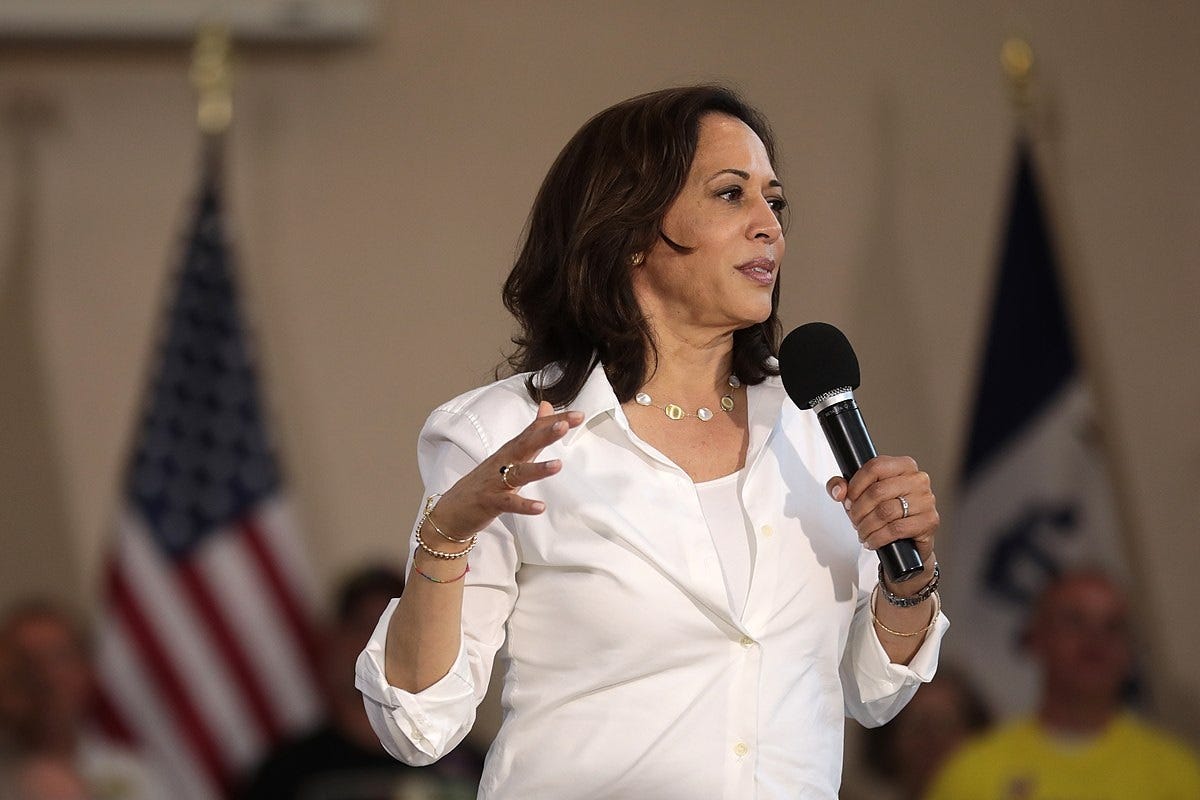
“The so-called weirdos in this country stand as completely freaked out by the normal man as the normal man is completely freaked out by the weird masses’ reaction to him” — Butthole Surfers
Traditionally, Donald Trump has been the expert at creating insults that get under his opponents’ skin. But over the past week or so, Kamala Harris and her allies have come up with a put-down so devastating that Republicans seem to have no answer for it. They’re calling Trump and his VP nominee J.D. Vance “weird”.
“Weird” doesn’t seem like a particularly harsh or savage label. It’s much more milquetoast than any number of insults Trump has deployed over the years. But it appears to be driving MAGA types absolutely up the wall:
Right-wing media has scrambled to prove that J.D. Vance, in particular, is not “weird”. Predictably, this defensive reaction has only intensified the Democratic taunts.
Meanwhile, Democrats — and the press — seem galvanized by the word. Harris is surging in the polls and giving speeches to wildly cheering crowds. She’s still an underdog to win the election, but her approval rating has soared past Trump’s:
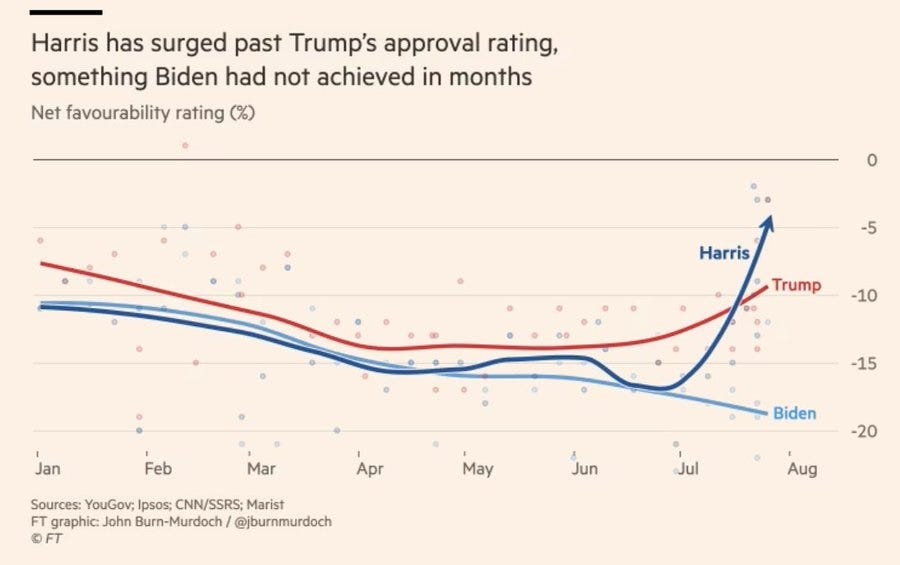
More and more Democratic politicians are repeating the “weird” line.
Why is this simple, seemingly mild insult hitting so hard? In fact, I think there are two reasons — one that explains why it’s getting under Republicans’ skin, and one that explains why Democrats love it so much.
To Republicans, “weird” means “outgroup”
To Republicans, being called “weird” is a bitter demonstration of their defeats in the culture wars of the 1990s, 2000s, and 2010s.
When I was growing up in the 90s, my friends and I — a bunch of nerdy kids pretty similar to the protagonists of Stranger Things — loved to call ourselves “weird”. We didn’t make that up ourselves — it was a cue we took from pop cultural figures that we admired, from Weird Al Yankovic to Dr. Demento. It was also something we learned from our parents — hippie Boomers who rebelled against the dominant culture of the 60s by embracing countercultural figures like Abbie Hoffman or Timothy Leary.
This embrace of “weirdness” wasn’t purely political — much of it was about the push for individualism and self-expression that defined 20th century American culture. Lots of Americans wanted to avoid traditional corporate jobs, listen to avant-garde music, explore fantasies like Dungeons and Dragons, learn about foreign cultures, experiment with sex and drugs, create alternative fashions, and so on.
But there was undeniably a political aspect to it as well. “Weirdness” meant self-expression, but it also meant rebellion against the dominant conservative culture of the day. In the 60s, “normal” required supporting your country and its troops in Vietnam, while protesting the war was “weird”. As late as the 1990s, people who went to church and had traditional families and avoided drugs were “normal” in most of America, and gay people and atheists and intentionally childless people and drug users were “weird”. Here are a couple of charts to illustrate just how different our current era is from the one I grew up in:
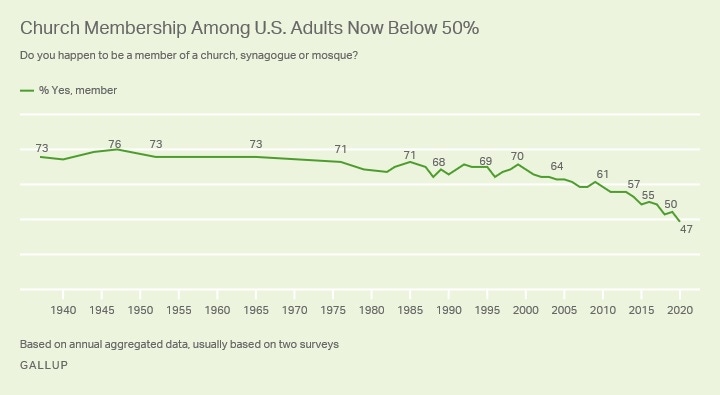
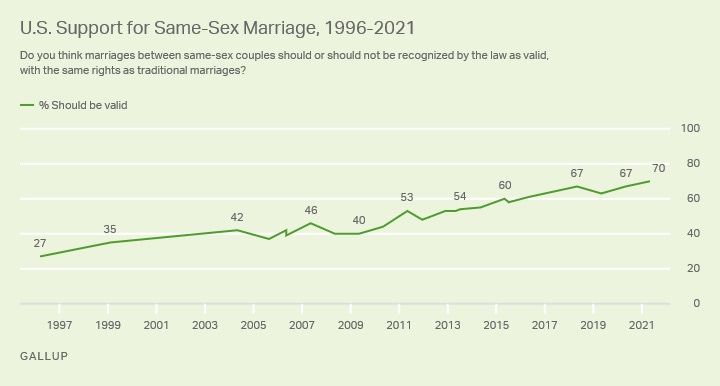
It’s important to remember that the Democratic Party itself was, during the 20th century, largely a collection of outgroups huddling together defensively against a dominant White Protestant culture.1 That alliance shifted over time — union workers, “white ethnics”, and southerners left the coalition — but the basic character of the party, and of the liberal movement in general, remained the outgroup all the way into the 90s.
By the time my friends and I were proudly calling ourselves “weird” in the 1990s, the accuracy of the label was questionable; the tide of the culture war was already beginning to turn. Acceptance of gays, marijuana, and atheism was on the rise; there was a feeling that the victory of liberal culture over conservative culture was only a matter of time. My friends and I were a lot less rebellious and pioneering than our Boomer parents had been — it was a lot less socially and economically risky to grow your hair out and listen to rock music and make jokes about Satan in 1996 than it had been in 1966.2
Now, a few decades later, the fact that they won is not in doubt. Homosexuality, recreational drugs, and all sorts of alternative lifestyles are broadly accepted in American public life. 28% of the population is religiously unaffiliated, while fewer than half of Americans go to church. The idea of America as a fundamentally White Protestant nation, ascendant in the early 20th century, is now basically defunct.
That doesn’t mean culture wars are over — the battleground has shifted to things like trans issues, wokeness, DEI, and so on. And conservatives may have lost cultural hegemony, but they still have plenty of institutional power — witness the Supreme Court’s decisions against abortion rights and affirmative action. But the cultural conflicts that defined my youth were all won by the side that my friends and I supported.
Exactly how liberals won America’s culture wars between 1990 and 2020 is a fascinating topic that deserves its own post. Briefly, I think there were four main causes:
The rise of the knowledge economy caused educated people and intellectuals to cluster in coastal metros and college towns, where they could be free of conservative social pressure and amplify each other’s liberalism. (This was the “Big Sort”.)
The internet introduced young people to sex culture, drug culture, gay culture, and foreign cultures at an early age, and it also broke churches’ local monopoly over socialization in small towns.
As a delayed reaction of desegregation and Civil Rights, Black American entertainers came to dominate much of the U.S. music and sports industries, raising the cultural cachet of Black America.
As the country got richer, educated people’s taste for variety naturally caused them to want more varied, cosmopolitan lifestyles than conservative culture allowed.
As an aside, I do not think immigration, or the changing racial composition of America, was a big factor. Hispanics did tend to vote for the Democrats, but the culture wars were not downstream of electoral victories; overall, Hispanics were and are more culturally conservative than White Americans. And while the rise of an Asian American elite may ultimately have a big impact on American culture, but I don’t think it has done so yet.
In any case, the way the liberals won the culture wars was by taking the high ground — by dominating the values of the educated elite. Education polarization — the biggest shift in American politics since the 80s, and the fundamental fact of American politics today — is a result of liberals’ culture-war strategy of seizing the high ground.
My high school friends and I were perfectly emblematic of this shift. We styled ourselves as “weird” rebels like our hippie parents, but in fact we were mostly just a bunch of studious nerds, preparing to ace our AP tests and go to top colleges and take our place among the high-earning knowledge-worker elite in coastal metros and college towns. Already we could sense that once we got out of our sleepy Texas hometown, we wouldn’t have to worry about conservative culture any more.
Instead, it was conservatives who felt out of place in the liberal knowledge-worker enclaves that my generation carved out. If you admitted to being gay in my hometown, you might have been shunned, or even bullied; in San Francisco in the 2010s, it would be as normal as admitting you were left-handed. But whereas if you declared that “Christ is King” in my hometown, you would have elicited nods of assent from most people, if you declared that in a room full of Silicon Valley tech workers in 2015, you might generate some uncomfortable stares.
This inversion of ingroup and outgroup naturally dismays and rankles conservatives — especially educated ones who live in blue cities, but also those who are bombarded with liberal culture in TV, movies, and music all the time. Their everyday experience is as a counterculture and an outgroup, but they still have the cultural memory of when they were the “normal” majority. This manifests as a profound sense of loss and dispossession.
When Democrats like Kamala Harris call conservatives “weird”, I think it presses directly on this open wound. It’s a bitter reminder of the hegemony they’ve lost since 1990, and the exile in which they now wander. “Weird”, to conservatives, means “outgroup”, and that’s why they hate it so much.
Now before I go on, I should mention that I think conservatives are somewhat well-positioned to fight back over the next decade or two — if not back to the hegemony they enjoyed in the 1980s, then at least to a position of greater parity. Liberals, in their new incarnation as “progressives”, have overextended themselves pretty severely on a number of fronts. There is a large working-class and middle-class silent majority out there in America who disagrees with progressive activists on most issues.
But conservative elites have their work cut out for them harnessing that silent majority, because A) there are so few educated conservatives nowadays that it’ll be hard to provide intellectual leadership to the masses, and B) the multiracial nature of the silent majority will make a new conservative movement slower to coalesce. In the meantime, conservatives — especially educated conservatives in blue metros and knowledge industries — will continue to suffer the pain of being “weird”.
To Democrats, “weird” means the unrest of the 2010s
I do not think Democrats are using “weird” as a taunt about cultural hegemony, even if that’s how many Republicans take it. Instead, I think Democrats are using the term to represent the chaos and unrest of the 2010s — something they associate with Trump, and which they increasingly want to leave behind them.
Consider this op-ed by Rex Huppke in USA Today. Huppke takes the opportunity to vent about all the genuinely creepy and wacky behavior that has come to be associated with the MAGA movement:
There are millions upon millions of American voters ‒ certainly liberals and independents, and I’d bet a decent slice of conservatives ‒ who have spent the past eight or so years watching Trump and the MAGA circus and thinking: “Wow, this is all very weird.”…
The rise of Trumpism and the bizarre chaos it ushered in ‒ from family members lost down conspiratorial rabbit holes to the denial of facts and abandonment of shared reality ‒ has given us election lies and Trump-branded Bibles and Rudy Giuliani giving an insane news conference outside a landscaping business in Philadelphia and a dude called the QAnon Shaman wearing a horned fur cap as he joined an attack of the U.S. Capitol…
It’s certainly the most apt label for Trump and his unhinged rants, his nonsensical stories about sharks or Hannibal Lecter, his blabbering cruelty and unfiltered spouting of whatever odd thought passes through his hate-addled mind…He is supported by slavish Republicans who once openly denounced him, and their hypocrisy is weird…The GOP presidential nominee is a twice-impeached, one-term president who was convicted of 34 felony counts of falsifying business records in a case involving hush money paid to an adult film star. He has had multiple bankruptcies, faces hundreds of millions of dollars in fines from a civil fraud ruling and was found liable of sexual abuse. And he is revered by the Republican Party's evangelical base…
Do you want to know what’s weird to a majority of Americans who are just trying to live their lives? EVERYTHING IN THOSE PREVIOUS THREE PARAGRAPHS!
I can’t really disagree with anything Huppke says here.
I think the weirdness of Trump’s movement comes partially from the fact that it’s so centered around social media, and social media aggregates and encourages some of the weirdest people in the country. I also think part of the weirdness is that with the decline of Christianity, weird cultish conspiracy theories like QAnon have filled some conservatives’ need for a sense of mystery and connection with the ineffable. Christian conservatism provided a bedrock base of “normalcy” to the right-wing movements of the 1980s, 90s, and 2000s; now the GOP standard-bearer is an irreligious sybarite who cares little for Jesus Christ, and evangelical Christians are an often-uneasy junior partner in Trump’s coalition.
But the biggest reason MAGA is so weird is probably just the unrest of the 2010s. The era of political, social, and cultural upheaval that began around 2013-14 — and which I often liken to the late 60s and early 70s — drove a lot of Americans kind of nuts, and at the same time it elevated many of the craziest people to positions of influence and attention. Social media exacerbated this, of course, but if you read about episodes of unrest in other countries, or in America’s own past, you’ll quickly see a lot of commonalities. Everyone gets a little weirder when the social and political foundations of their society start to shake.
And so I also think there is tons of weirdness in the modern progressive movement, from wacky Palestine protests to bizarre DEI copypasta to “woke” protests that take on the feel of 19th century Congregationalist revivals. The progressive movement of the past decade was formed by social media just as much as the MAGA movement, and it also lacks the coordinating anchor of an organized religion. “White women for Kamala” was an intensely weird event.
Obviously, Democratic partisans like Huppke aren’t going to talk about progressive weirdness. But all the same, I see the “weird” slogan as a sign that many Democrats want to put the unrest behind them. An article in Politico shrewdly noted that the “weird” label is being substituted for darker, more apocalyptic rhetoric about Trump’s threat to democracy that had been the normal vector of attack in earlier years:
As this simple and quintessentially Midwestern description of Trump and Vance catches on, it marks a notable rhetorical shift — away from Biden’s apocalyptic, high-minded messaging toward a more gut-level vernacular that may better capture how many voters react to far-right rhetoric...
“It perfectly describes the uneasiness people feel. It’s how people who don’t live and breathe politics every day react to hearing the Republican vice presidential candidate denigrate people without children,” said Tim Hogan, a Democratic strategist who worked on the 2020 presidential campaign of another Minnesotan, Sen. Amy Klobuchar. “It’s simple. It’s how you might talk to your neighbor about the crazy political climate we’re living in.”
Bashing Trump for being “weird” instead of for being a fascist dictator suggests that Democrats want to return to a more normal, staid sort of politics. That’s a good sign, and it’s matched by real moderate positions that Kamala is taking on issues like the border crisis. And if that vector of attack is successful, it’ll put some pressure on Republicans to abandon their own grim apocalyptic rhetoric about civil war, invasion, and the destruction of America.
The new, more laid-back language is also a sign that Democrats are moving away from the revolutionary rhetoric of the late 2010s and (especially) 2020. The notion that America is a White supremacist entity that needs to be overthrown by an alliance of the “marginalized” never became the official Democratic party line, but it was a very common idea among movement progressives. That idea may now be quietly on the way out. “Weird” just isn’t something you call your evil overlord, which suggests that Democrats are slowly walking away from the notion that they are an oppressed people ruled by evil overlords.
In any case, there is plenty of evidence that Americans as a whole are ready for a return to a quieter, more “normal” era of politics. Many Americans are angry about the current political situation, but even more describe themselves as simply “exhausted”:
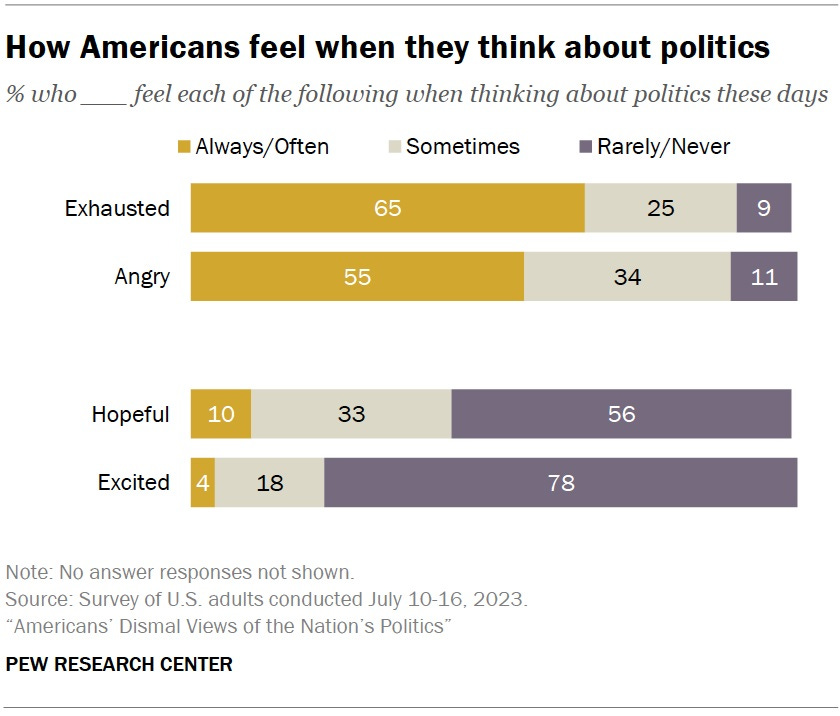
A lot fewer Americans are tuning in to political news this year than in the last presidential cycle. Even the reaction to the assassination attempt on Trump a few weeks ago was mostly one of exhausted apathy; there was plenty of outrage and enthusiasm for civil conflict among rightists on Twitter X, but that platform no longer represents American public opinion, if it ever did. Back in the real world, Trump’s poll bounce from the assassination attempt was small and short-lived.
This, I think, is why the “weird” attack is sparking so much enthusiasm. The 2010s were a weird, weird time in American politics, and Trump was the defining figure of that era. In the late 60s and early 70s, that figure was Nixon — it was Carter, and most importantly Reagan, who signaled a return to normalcy after Nixon exited the scene. Perhaps in the 2020s the prophet of normalization will be Kamala Harris. That’s definitely not what I predicted, but if it happens, I’ll be relieved — and I doubt I’ll be the only one.
The quote at the top of this post is from the Butthole Surfers, a Texas rock band who named themselves after a vulgar slur for gay people despite themselves being straight. An act of solidarity with gay people was an act of rebellion against the dominant conservative culture that the band rebelled against.
If you want a microcosm of how the countercultural and self-expressive weirdness of the 20th century ebbed out of liberal America, just look at the city of Austin, Texas. In the 1980s, Austin was genuinely an incredibly weird place, since it was the refuge for anyone and everyone who didn’t fit in in conservative Texas culture. Go watch the movie Slacker — one of my favorite films of all time — to get a taste of what Austin was like in that era. But as Texas cities all turned blue, there was less need to go to Austin if you were gay or did drugs or whatever. Instead, Austin became just another tech hub, and the kind of people who went there were progressive professional types similar to the ones you’d find in Seattle, San Diego, or Boston. “Keep Austin Weird” merchandise, complete with fake tie-dye patterning, is now mass-produced and sold by local businesses to tourists who never got to see the weird Austin.



It was former President George W. Bush who first said, after listening to Trump's "American Carnage" Inauguration Speech, "Now that was some weird shit."
MAGA wants Democrats to go back to talking about policy, because they know that's boring. They want all the snark and jokes coming from them.
It's a tragedy that swing voters are not interested in policy, but that is a fact. It is a tragedy that the 2024 election has come down to sandbox insults, but that is a fact.
I have been thinking for several weeks that Dems need to flood the zone with **** a la Steve Bannon. Just generate so many insults that it is impossible for the other side to answer. Although I love Joe Biden and prefer him to Harris, he just was incapable of such mindless insults.
So, to contribute to the cause I have composed my own mindless insult in the voice of Adam Sandler.
Where de weirdos?
Dere de weirdos!
Scare de weirdos!
Warn de weirdos!
Tell them they are way, way out on a bell-shaped-curve.
[Good luck explaining that.]